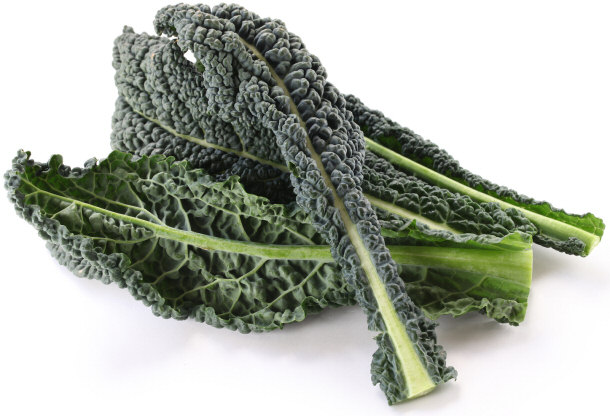Kale, also known as Borecole, comes in different varieties: curly, plain leaved, rape kale, leaf and spear, and Cavolo Nero (also known as Black Cabbage, Tuscan Cabbage, Tuscan Kale, Lacinato and Dinosaur Kale). Kale is related to Cabbage, Collards, Broccoli, and Brussels Sprouts, all members of the Brassica family. Click here to learn more about Kale.
To Store
Store Kale in the refrigerator where it will keep for 5 days. The longer it is stored, the more bitter its flavor becomes. Do not wash Kale before storing; exposure to water encourages spoilage.
To Nourish
Kale has many health benefits. Kale is very high in Beta Carotene, Vitamin K, Vitamin C, and rich in Calcium. Kale is a source of two Carotenoids, Lutein and Zeaxanthin. Kale, as with Broccoli and other Brassicas, contains Sulforaphane (particularly when chopped or minced), a chemical with potent anti-cancer properties. Boiling decreases the level of Sulforaphane; however, steaming, microwaving, or stir frying do not result in significant loss. Along with other Brassica vegetables, kale is also a source of Indole-3-carbinol, a chemical which boosts DNA repair in cells and appears to block the growth of cancer cells. Kale has been found to contain a group of resins known as bile acid sequestrants, which have been shown to lower cholesterol and decrease absorption of dietary fat. Steaming significantly increases these bile acid binding properties. To learn more about health benefits of Kale click here.
To Prepare
Kale can be eaten raw, steamed, sauteed and braised as a short list example.
To Try
Squash and Kale Toasts
Tuscan Kale Salad
Kale and Apple Salad with Pancetta and Candied Pecans
Flashed Cooked Green
Kale with Currants, Lemon and Olives
Crispy Baked Kale with Gruyere Cheese
Gingery Creamed Kale and Cabbage
White Bean and Kale Soup
Sea Scallops with Ham Braised Cabbage and Kale
Kale and Steak Salad
Homemade Green Chorizo Tacos with Kale and Potatoes
To Use
Williams-Sonoma Cooking from the Farmers' Market Cookbook offers fresh inspiration for healthy, delicious dining. Their comprehensive cookbook offers 245 recipes designed to help you make the most of fresh produce. Each fruit and vegetable is accompanied by vibrant color photographs that make it easy to identify, along with three simple recipes showcasing the natural flavors of the starring ingredient. The book also provides detailed information on selection, storage and preparation for all types of produce. Hardcover, 272 pages. ($34.95, Williams-Sonoma)


